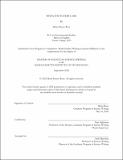When the Waters Came
Author(s)
Rose, Maria Parazo
DownloadThesis PDF (233.3Kb)
Advisor
Lightman, Alan
Terms of use
Metadata
Show full item recordAbstract
In March 2019, record-breaking floods swept through the Midwest, leaving cities and farmland razed, broken, and drowned. Hundreds of people were displaced, and millions of acres of agricultural land were submerged. Thousands of livestock died; people reported carcasses floating in the currents. Silos were crushed and stored grains were contaminated, losing seasons of labor in a matter of days. But even when the water receded and returned to the confines of its banks, there was no relief for farmers like Jeremy Mahon and his family. Ranchers and farmers are still struggling, three years and hundreds of thousands of lost dollars later.
As climate change exacerbates weather variability and storm severity, areas like the Midwest are expected to see more, and worse, floods and other disasters. Agriculture is crucial to the region’s economic success and residents’ livelihoods, so it will be increasingly important to prioritize conservation and adaptation-focused farming practices to ensure the industry’s safe continuity. But there’s a challenge: for social, cultural, and financial reasons, various people and communities simply don’t want to adapt. As disasters intensify, this resistance may be one of our biggest obstacles to successfully preparing for climate change impacts — the worst of which are still to come.
This thesis explores the long-term impacts of the March 2019 floods on agricultural production, specifically in northeast Nebraska. Though the state at large has mostly recovered, small rural towns and farming communities are still dealing with the repercussions. The thesis goes on to explore the question of what holds people back from taking on adaptive farming practices, which is an important question given that climate risk is increasing, that consequences of disasters are long-lasting and severe, as well as immediately damaging, and that farming is as vital as it is to this area.
Date issued
2022-09Department
Massachusetts Institute of Technology. Program in Comparative Media Studies/Writing; Massachusetts Institute of Technology. Graduate Program in Science WritingPublisher
Massachusetts Institute of Technology